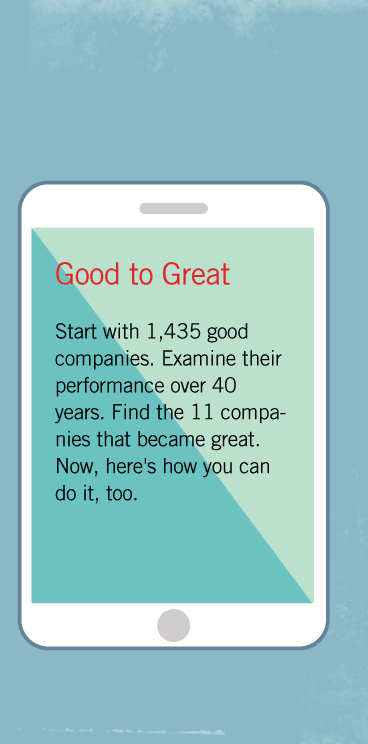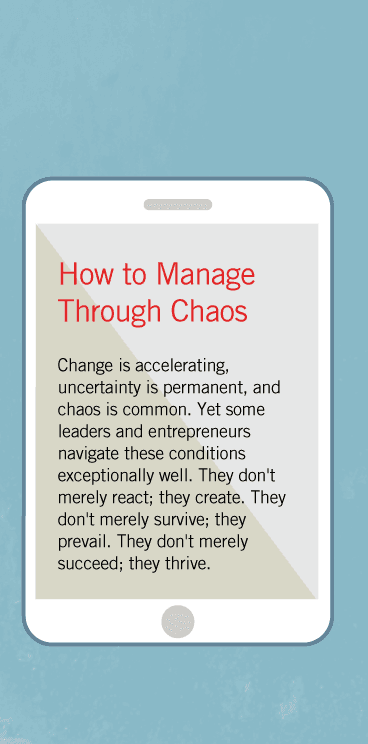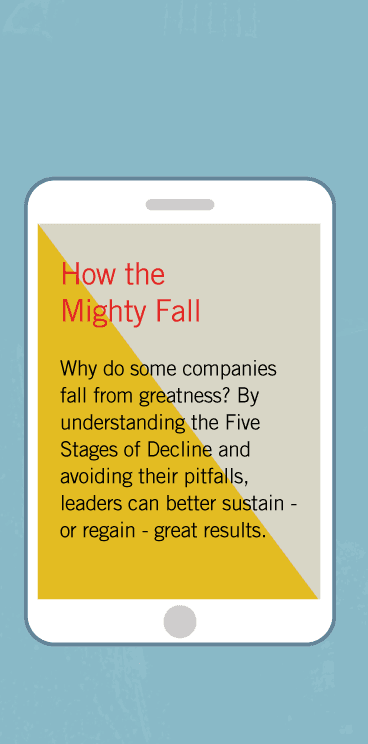The Learning Executive
Inc.
August 1997
How would your day be different if you organized your time, energy,
and resources primarily around the objective of learning, instead
of around performance? For many people, their daily activities—what
they do and how they go about doing it—would be dramatically
changed. Indeed, despite all the buzz around the concept of the
“learning organization,” I’m struck by how few people
seem to have embraced the idea of being a true learning person.
This came home to me during an interview with a television producer developing a documentary on Sam Walton. After about 45 minutes, she asked if I had anything else to add, indicating the end of the interview. “No,” I said, “but I’d like to ask you some questions.” She paused, obviously not prepared for my request, and then gave an uncertain, “Ok.” For the next 15 minutes, I had the great pleasure of asking her questions about what she had learned in her research. The producer had no background in business—having done most of her documentaries on historical figures like Stalin and Mozart—so I thought she might have a fresh and illuminating perspective. She did, and I learned some new information and gained new insights about one of my favorite subjects.
“That’s the first time that’s ever happened to me,” she said. “I interview professors and experts all the time, but I’ve never had one turn the tables and begin asking me questions. At first I was taken aback—surprised really—but it’s refreshing to see that experts can still learn.”
Stop and think about that for a minute. Here’s a bright television producer who spends her life delving into specific subjects—a walking treasure trove of knowledge—and people whose profession is to continually learn don’t pause to take the opportunity to expand their expertise further by talking with her. They act as knowers rather than learners, which, incidentally, is just the opposite of what Sam Walton did.
Walton viewed himself not as a definitive expert on retailing but as a lifelong student of his craft, always asking questions and taking every opportunity to learn. A Brazilian businessman once told me that of 10 U.S. retailing CEOs he wrote to asking for an appointment after he'd purchased a discount retailing chain in South America, only Walton said yes. “We didn’t know much about retailing, so we wanted to talk to executives who knew the business,” he explained. “Most didn’t bother to reply. Sam said, ’Sure, come on up.’ Only later did I realize he was as interested in learning from us as we were in learning from him; he pummeled us with questions about Brazil. Later, we launched a joint venture with Wal-Mart in South America.”
Becoming a learning person certainly involves responding to every situation with learning in mind, as Walton did. But it involves more than that; it requires setting explicit learning objectives. Look at your personal list of long-term objectives mid-term objectives, and your current to-do list. How many items fall into the performance genre and how many fall into the learning genre? How many begin with the structure “My objective is to learn X,” rather than “My objective is to accomplish Y”? Most people operate off of to-do lists. They’re a useful mechanism for getting things done. A true learning person also has a “to-learn” list, and the items on that list carry at least as much weight in how one organizes his or her time as the to-do list.
Granite Rock, in Watsonville, Calif., one of the few authentic learning organizations, has institutionalized this idea by replacing performance goals for individuals with learning goals. The stone, concrete, and asphalt supplier makes the shift explicit by asking each employee to set his or her annual objectives in the format “Learn _______ so that I can _________.”
Learning people also develop explicit learning mechanisms, such as “learning logs” or formal “autopsies”—time explicitly set aside to discuss or reflect on events and extract the maximum knowledge and understanding from them. Such people plant seeds of learning that will flower later. One prominent thinker I spent a day with ended our discussion with the statement, “I have a small consulting fee: you must keep me informed as to your learning and progress.” Every six months or so I send him a letter, and I imagine he gets dozens of such learning letters a year. I’ve also found the mechanism of a learning notebook to be useful; in it I keep track of my learning and observations about life, work, myself, or whatever seems interesting, much the same way a scientist keeps a lab book on any subject of inquiry. It’s a powerful mechanism for identifying not only learning but also the activities where I’m not learning (which I then unplug or redesign).
I’m not yet as much of a learning person as I’d like to be. Like most Americans, I’m driven largely by an urge to perform, accomplish, achieve, and get things done. Yet as I begin to consciously shift to filtering everything through a learning lens, I find both dramatic and subtle differences in the way I do things and how I spend my time. With a “get things done” lens, I’ll leave a voice-mail; with a learning lens, I’ll seek a real-time phone call during which I can ask questions and learn from conversation. With a performance lens, I’ll try to impress the interviewer with my knowledge; with a learning lens, I’ll ask her questions. Even mundane activities like washing dishes, shaving, and walking through airports can be transformed by carrying a portable tape player and listening to unabridged books on tape.
John W. Gardner, author of the classic book Self-Renewal: The Individual and Innovative Society (and a man who keeps an active learning and teaching schedule well into his 80s), captured the spirit of the learning person with his admonition “Don’t set out in life to be an interesting person; set out to be an interested person.” Learning people, of which Gardner is a prime example, learn till the day they die, not because learning will “get them somewhere,” but because they see learning as part of the reason for living. When asked for an economic justification for learning, they find the question as odd as being asked for a financial justification for breathing. The link between learning and performance is self-evident, but for a true learning person (or organization, for that matter), performance is not the ultimate why of learning. Learning is the why of learning. And until we grasp that fact and organize accordingly, we will not—indeed cannot—build the elusive learning organization.
This came home to me during an interview with a television producer developing a documentary on Sam Walton. After about 45 minutes, she asked if I had anything else to add, indicating the end of the interview. “No,” I said, “but I’d like to ask you some questions.” She paused, obviously not prepared for my request, and then gave an uncertain, “Ok.” For the next 15 minutes, I had the great pleasure of asking her questions about what she had learned in her research. The producer had no background in business—having done most of her documentaries on historical figures like Stalin and Mozart—so I thought she might have a fresh and illuminating perspective. She did, and I learned some new information and gained new insights about one of my favorite subjects.
“That’s the first time that’s ever happened to me,” she said. “I interview professors and experts all the time, but I’ve never had one turn the tables and begin asking me questions. At first I was taken aback—surprised really—but it’s refreshing to see that experts can still learn.”
Stop and think about that for a minute. Here’s a bright television producer who spends her life delving into specific subjects—a walking treasure trove of knowledge—and people whose profession is to continually learn don’t pause to take the opportunity to expand their expertise further by talking with her. They act as knowers rather than learners, which, incidentally, is just the opposite of what Sam Walton did.
Walton viewed himself not as a definitive expert on retailing but as a lifelong student of his craft, always asking questions and taking every opportunity to learn. A Brazilian businessman once told me that of 10 U.S. retailing CEOs he wrote to asking for an appointment after he'd purchased a discount retailing chain in South America, only Walton said yes. “We didn’t know much about retailing, so we wanted to talk to executives who knew the business,” he explained. “Most didn’t bother to reply. Sam said, ’Sure, come on up.’ Only later did I realize he was as interested in learning from us as we were in learning from him; he pummeled us with questions about Brazil. Later, we launched a joint venture with Wal-Mart in South America.”
Becoming a learning person certainly involves responding to every situation with learning in mind, as Walton did. But it involves more than that; it requires setting explicit learning objectives. Look at your personal list of long-term objectives mid-term objectives, and your current to-do list. How many items fall into the performance genre and how many fall into the learning genre? How many begin with the structure “My objective is to learn X,” rather than “My objective is to accomplish Y”? Most people operate off of to-do lists. They’re a useful mechanism for getting things done. A true learning person also has a “to-learn” list, and the items on that list carry at least as much weight in how one organizes his or her time as the to-do list.
Granite Rock, in Watsonville, Calif., one of the few authentic learning organizations, has institutionalized this idea by replacing performance goals for individuals with learning goals. The stone, concrete, and asphalt supplier makes the shift explicit by asking each employee to set his or her annual objectives in the format “Learn _______ so that I can _________.”
Learning people also develop explicit learning mechanisms, such as “learning logs” or formal “autopsies”—time explicitly set aside to discuss or reflect on events and extract the maximum knowledge and understanding from them. Such people plant seeds of learning that will flower later. One prominent thinker I spent a day with ended our discussion with the statement, “I have a small consulting fee: you must keep me informed as to your learning and progress.” Every six months or so I send him a letter, and I imagine he gets dozens of such learning letters a year. I’ve also found the mechanism of a learning notebook to be useful; in it I keep track of my learning and observations about life, work, myself, or whatever seems interesting, much the same way a scientist keeps a lab book on any subject of inquiry. It’s a powerful mechanism for identifying not only learning but also the activities where I’m not learning (which I then unplug or redesign).
I’m not yet as much of a learning person as I’d like to be. Like most Americans, I’m driven largely by an urge to perform, accomplish, achieve, and get things done. Yet as I begin to consciously shift to filtering everything through a learning lens, I find both dramatic and subtle differences in the way I do things and how I spend my time. With a “get things done” lens, I’ll leave a voice-mail; with a learning lens, I’ll seek a real-time phone call during which I can ask questions and learn from conversation. With a performance lens, I’ll try to impress the interviewer with my knowledge; with a learning lens, I’ll ask her questions. Even mundane activities like washing dishes, shaving, and walking through airports can be transformed by carrying a portable tape player and listening to unabridged books on tape.
John W. Gardner, author of the classic book Self-Renewal: The Individual and Innovative Society (and a man who keeps an active learning and teaching schedule well into his 80s), captured the spirit of the learning person with his admonition “Don’t set out in life to be an interesting person; set out to be an interested person.” Learning people, of which Gardner is a prime example, learn till the day they die, not because learning will “get them somewhere,” but because they see learning as part of the reason for living. When asked for an economic justification for learning, they find the question as odd as being asked for a financial justification for breathing. The link between learning and performance is self-evident, but for a true learning person (or organization, for that matter), performance is not the ultimate why of learning. Learning is the why of learning. And until we grasp that fact and organize accordingly, we will not—indeed cannot—build the elusive learning organization.
Copyright © 1997 Jim Collins, All rights reserved.






